Unit 3 The world online Task(1) 课件(35张PPT)
文档属性
| 名称 | Unit 3 The world online Task(1) 课件(35张PPT) |  | |
| 格式 | zip | ||
| 文件大小 | 465.5KB | ||
| 资源类型 | 教案 | ||
| 版本资源 | 牛津译林版 | ||
| 科目 | 英语 | ||
| 更新时间 | 2020-02-28 20:50:48 | ||
图片预览

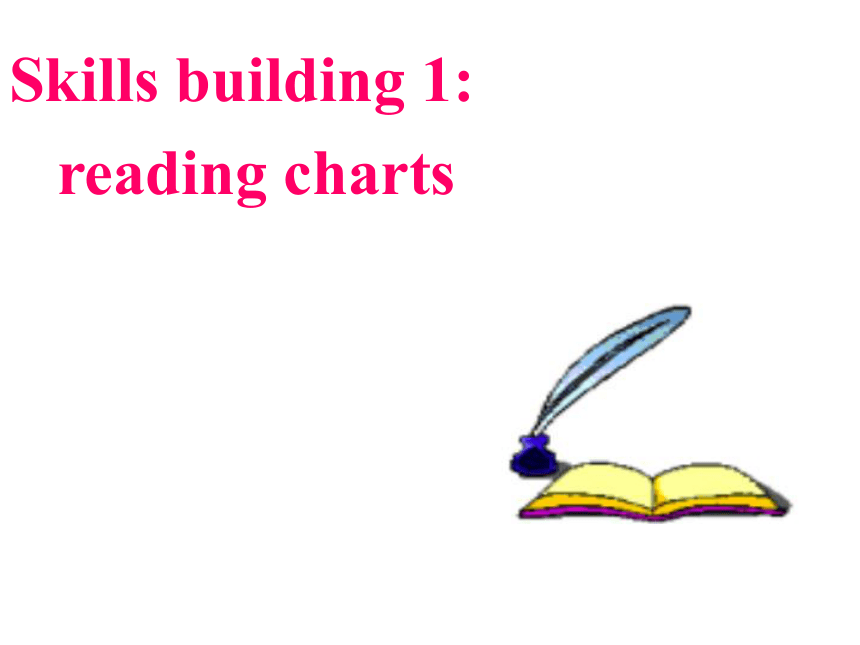


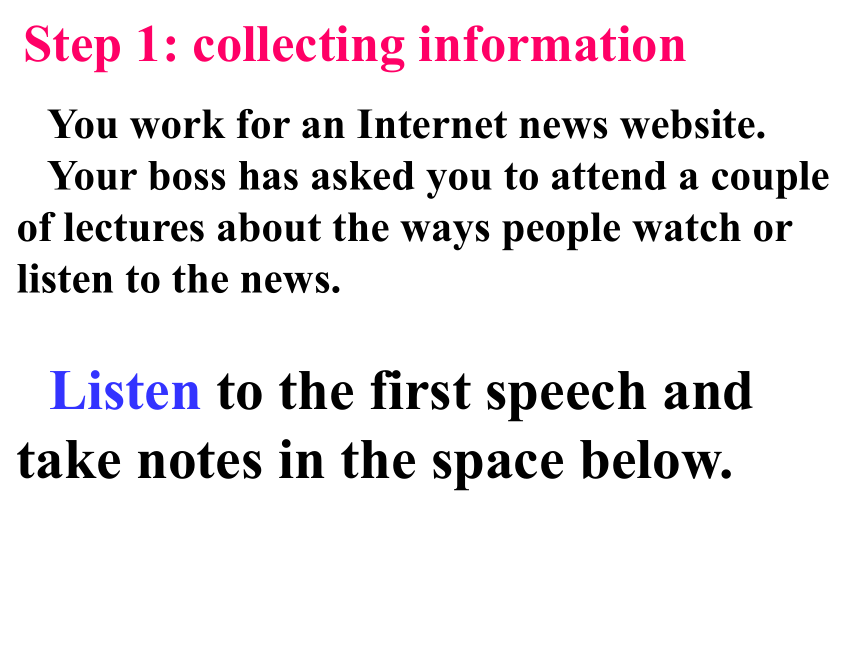

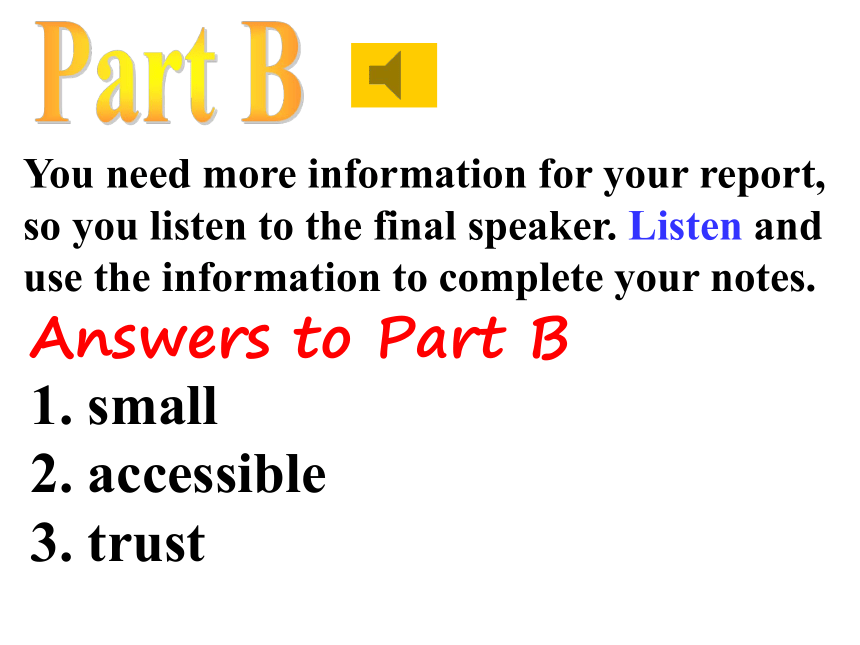
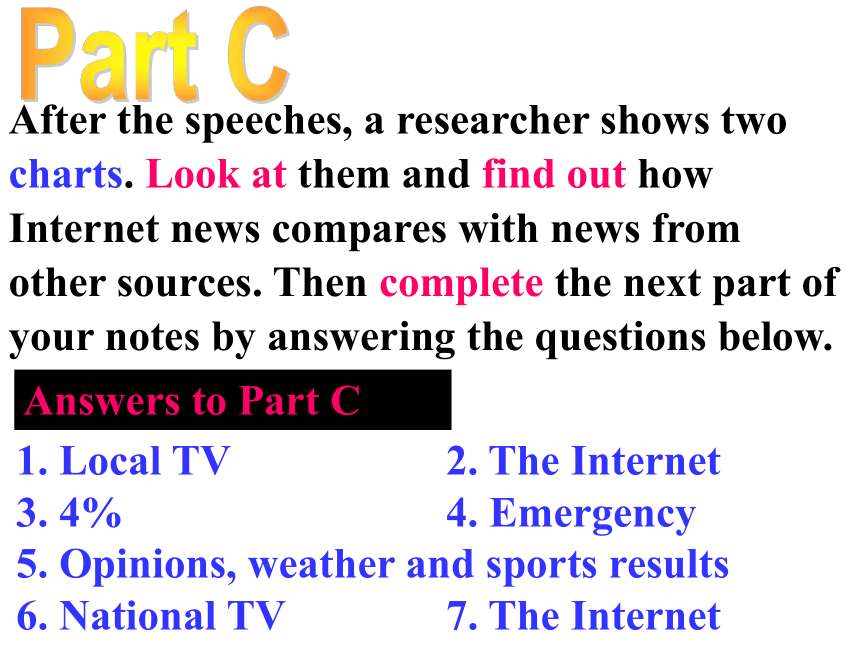


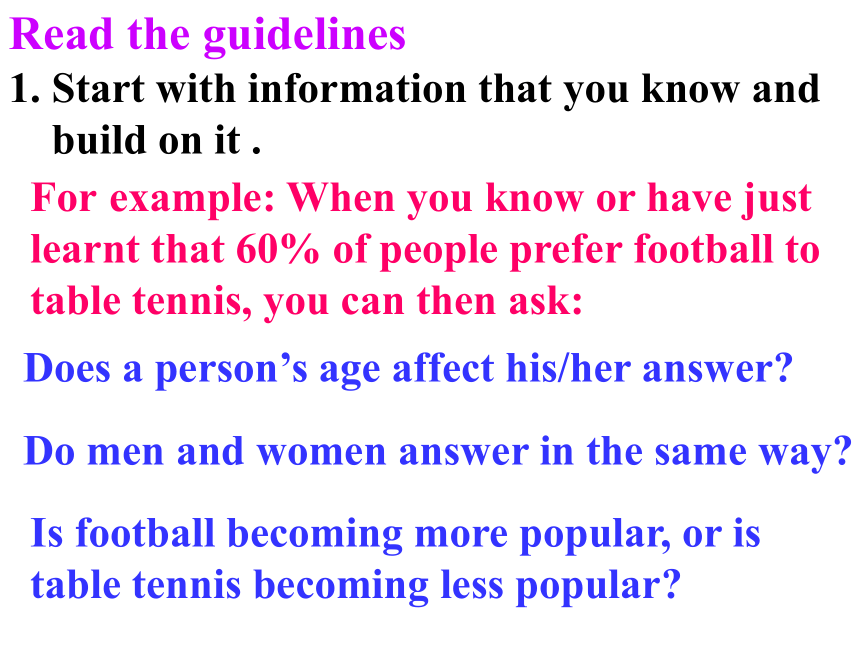

文档简介
(共35张PPT)
Getting news
from the Internet
Skills building 1:
reading charts
The bar chart shows the weight in kilograms of some fruit sold one day by a market. We can see that 52 kg of apples were sold, 40 kg of oranges were sold, and 8 kg of star fruit were sold.
We have some other charts. Let’s see them.
The chart is called the pie chart .
Step 1: collecting information
You work for an Internet news website.
Your boss has asked you to attend a couple
of lectures about the ways people watch or
listen to the news.
Listen to the first speech and
take notes in the space below.
Answers to Part A:
(1) radio (2) scores
(3) the Internet (4) changes
(5) updated (6) TV
(7) important (8) wider
drive (10) watch TV
Answers to Part B
1. small
2. accessible
3. trust
You need more information for your report,
so you listen to the final speaker. Listen and
use the information to complete your notes.
After the speeches, a researcher shows two
charts. Look at them and find out how
Internet news compares with news from
other sources. Then complete the next part of
your notes by answering the questions below.
Answers to Part C
Local TV 2. The Internet
3. 4% 4. Emergency
5. Opinions, weather and sports results
6. National TV 7. The Internet
Why do 60 per cent of people trust the news sources from national TV and local TV, while only 7 per cent of people trust the news on the Internet?
Skills building 2:
forming more specific questions
Read the guidelines
Start with information that you know and
build on it .
For example: When you know or have just learnt that 60% of people prefer football to table tennis, you can then ask:
Does a person’s age affect his/her answer?
Do men and women answer in the same way?
Is football becoming more popular, or is
table tennis becoming less popular?
2. Do not just ask about what people like or prefer. Also ask what they do not like or do not prefer, e.g.,
What sport do people like the least?
What sport do people prefer table tennis to?
3. Find out why. Once you have the facts, you can try to find out why they are true. This kind of information will be helpful if you need to support or explain the fact you have learned, e.g.
Why is football more popular?
Step 2:
asking more specific questions
Suppose you need to ask one speaker his opinion on the situations that people get news from the Internet.
Work individually to think up and write down as many questions as you can to find more specific information.
Skills building 3:
reporting on facts and figures
What shall we pay attention to when
we write a report? For example,
when you are asked to write a report
on how the students in your class
think they should spend their time,
what should you include?
Question:
Try to tell which of the following are facts and which are opinions.
1. Computers are still too expensive for many people.
2. I think reading newspapers is the easiest way to get news.
3. You can not only see ‘real’ images on TV but also hear them talk.
4. News on the Internet is updated every hour.
5. Some people consider Internet news to be unbelievable.
fact
opinion
fact
fact
opinion
Step 3:
e-mailing a report
Your boss asked you to write a report about the lectures you attended. Write an e-mail to tell him what you have learnt about getting news from the Internet.
Dear Sir,
I went to listen to two speeches about the
ways people get news. From the first speaker,
I know there are different types of news, such
as sports results, weather and recent events,
and some of them are more suited to sources
like radio, newspapers, and television. There
is no doubt that the Internet is increasingly
popular, but the number of people is still
small. I have collected some figures from two
charts, each of which is a survey of 500
people. According to the two charts, the
percentage of people who turn first to the
Internet for news on emergency, opinions,
weather, latest news and sports results is
respectively only 2 %, 5 %, 5 %, 4% and 5%.
However, for news on emergency and
latest news, the percentage of people who
turn first to local TV comes to 53 %.
Why will people not turn first to the Internet
to get news? The second speaker gave the
following reasons: first, the Internet is still
not accessible to everyone; second, information on it is often uncontrolled; third, people do
not always trust the news online.
Yours,
……
Dear Sir,
I went to listen to two speeches about the ways people get
news. From the first speaker, I know there are different
types new, such as sports results, weather, politics and
current affairs, and some of them are more suited to
sources like radio, newspapers, and television. There is no
doubt that the Internet is increasingly popular, but the
number of people is still small. I have collected some
figures from two charts, each of which is a survey of 500
people. According to the two charts, the percentage of
people who turn first to the Internet for news on
emergency, opinions, weather, breaking news and sports
results is respectively only 2 per cent, 5 per cent, 5 per cent,
4 per cent and 5 per cent. However, for news on emergency
and breaking news, the percentage of people who turn first
to local TV comes to 53 per cent. Why will people not turn
first to the Internet to get news? The second speaker gave
the following reasons: first, the Internet is still not
accessible to everyone; second, information on it is often
uncontrolled; third, people do not always trust the news
online.
Yours,
xxx
A. Translation --- P42
1. 以图表的形式
2. bar charts
3. 流程图/曲线图
4. 圆形分格统计图/饼图
5. 参加三两个讲座
6. 记笔记
7. 更多的观点
in the form of charts
柱形、条形统计图表
flow charts
pie charts
attend a couple of lectures
a wider range of views
take notes
P43
8. 最新消息
9. 最少量的人
10. 上网查找新闻
P44
11. find yourself wanting to know more
12. 交换角色
13. 50 and up
14. check facts on other websites
15. 经营一家网站
16.与报纸有关的问题
the latest news
turn to the Internet for news
发现你自己想要了解的更多
50和50以上
在其它网站上核对事实
the least number of people
switch roles
run a website
problems ____newspapers
with
P45
17. 获得更好的锻炼
18. 用电子邮件发一份报告
get a better workout
e-mail a report
B. Language points:
What sport do people prefer table tennis
to? (P44)
比起什么运动来人们更喜欢乒乓球呢?
Do you prefer hot or cold weather?
你喜欢热天还是冷天?
(2) I prefer red wine to white.
比起白酒来,我更喜欢红酒。
(3) He prefers ________rugby to _______it.
比起打橄榄球来,他更喜欢看球。
(4) I'd prefer _____________(not discuss)
this issue.
watching
playing
not to discuss
(5) He prefers _____ to work by bike
rather than _____a bus.
比起乘公共汽车来,他更喜欢骑车去
上班。
(6) I'd prefer __________smoke.
(= I would like it better if you did not smoke).
你要是不吸烟就好了。
to go
take
you not to
【总结】prefer的用法:
____________________________________
____________________________________
____________________________________
_____________________________________
_____________________________________
(1) prefer (doing) sth.
// prefer (sb.) (not) to do sth.
(2) prefer (doing) A to (doing) B
(3) prefer to do A rather than do B
【Practice】
Rather than ________ other languages, nowadays some foreigners prefer __________ Chinese.
A. learn; to learn B. learning; to learn
C. learn; to learn D. to learn; learning
A
2. The first is to rely on facts and figures
more than opinions. (P45)
首先是依靠事实和依据而非观点。
(1) Jason is more than a lecturer; he is a
writer, too. ___________
(2) I have known David for more than 20
years. _________________
(3) In doing scientific experiments, one must
be more than careful with the instruments.
__________
(4) This book seems to be more a reference
book than a text. ________________
不仅仅是=not only
超过=over
很, 非常=very
与其说……不如说……
(5) Don’t bite off more than you can chew.
________
翻译: 贪多嚼不烂。
或: 别担任自己所不能胜任的事。
或: 要量力而行。
(6) He worked no more than a week, so he
could get not more than 100 yuan.
_____________; _________________
(7) He is more sad than angry.
______________________
超过
仅仅, 只不过=only
至多,不超过
与其说……不如说……
【总结】more than的用法:
_____________________________________
_____________________________________
_____________________________________
_____________________________________
_____________________________________
_____________________________________
more than + n., 表示“不仅仅是”
(2) more than+数词, 表示 “……以上/超过”
(3) more than + adj., 表示 “很, 非常”
(4) more…than…,表示 “与其说……不如说……”
(5) no more than = only 仅仅, 只不过
not more than = at most 至多, 不超过
【Practice】
(1) More than one student _______ (enjoy)
folk music.
(2) In that case, there is nothing you can do
______ wait.
A. more than B. other than
C. better than D. less than
enjoys
B
1. Review what we learned today.
2. Parts A and B in Writing on Page 125.
Getting news
from the Internet
Skills building 1:
reading charts
The bar chart shows the weight in kilograms of some fruit sold one day by a market. We can see that 52 kg of apples were sold, 40 kg of oranges were sold, and 8 kg of star fruit were sold.
We have some other charts. Let’s see them.
The chart is called the pie chart .
Step 1: collecting information
You work for an Internet news website.
Your boss has asked you to attend a couple
of lectures about the ways people watch or
listen to the news.
Listen to the first speech and
take notes in the space below.
Answers to Part A:
(1) radio (2) scores
(3) the Internet (4) changes
(5) updated (6) TV
(7) important (8) wider
drive (10) watch TV
Answers to Part B
1. small
2. accessible
3. trust
You need more information for your report,
so you listen to the final speaker. Listen and
use the information to complete your notes.
After the speeches, a researcher shows two
charts. Look at them and find out how
Internet news compares with news from
other sources. Then complete the next part of
your notes by answering the questions below.
Answers to Part C
Local TV 2. The Internet
3. 4% 4. Emergency
5. Opinions, weather and sports results
6. National TV 7. The Internet
Why do 60 per cent of people trust the news sources from national TV and local TV, while only 7 per cent of people trust the news on the Internet?
Skills building 2:
forming more specific questions
Read the guidelines
Start with information that you know and
build on it .
For example: When you know or have just learnt that 60% of people prefer football to table tennis, you can then ask:
Does a person’s age affect his/her answer?
Do men and women answer in the same way?
Is football becoming more popular, or is
table tennis becoming less popular?
2. Do not just ask about what people like or prefer. Also ask what they do not like or do not prefer, e.g.,
What sport do people like the least?
What sport do people prefer table tennis to?
3. Find out why. Once you have the facts, you can try to find out why they are true. This kind of information will be helpful if you need to support or explain the fact you have learned, e.g.
Why is football more popular?
Step 2:
asking more specific questions
Suppose you need to ask one speaker his opinion on the situations that people get news from the Internet.
Work individually to think up and write down as many questions as you can to find more specific information.
Skills building 3:
reporting on facts and figures
What shall we pay attention to when
we write a report? For example,
when you are asked to write a report
on how the students in your class
think they should spend their time,
what should you include?
Question:
Try to tell which of the following are facts and which are opinions.
1. Computers are still too expensive for many people.
2. I think reading newspapers is the easiest way to get news.
3. You can not only see ‘real’ images on TV but also hear them talk.
4. News on the Internet is updated every hour.
5. Some people consider Internet news to be unbelievable.
fact
opinion
fact
fact
opinion
Step 3:
e-mailing a report
Your boss asked you to write a report about the lectures you attended. Write an e-mail to tell him what you have learnt about getting news from the Internet.
Dear Sir,
I went to listen to two speeches about the
ways people get news. From the first speaker,
I know there are different types of news, such
as sports results, weather and recent events,
and some of them are more suited to sources
like radio, newspapers, and television. There
is no doubt that the Internet is increasingly
popular, but the number of people is still
small. I have collected some figures from two
charts, each of which is a survey of 500
people. According to the two charts, the
percentage of people who turn first to the
Internet for news on emergency, opinions,
weather, latest news and sports results is
respectively only 2 %, 5 %, 5 %, 4% and 5%.
However, for news on emergency and
latest news, the percentage of people who
turn first to local TV comes to 53 %.
Why will people not turn first to the Internet
to get news? The second speaker gave the
following reasons: first, the Internet is still
not accessible to everyone; second, information on it is often uncontrolled; third, people do
not always trust the news online.
Yours,
……
Dear Sir,
I went to listen to two speeches about the ways people get
news. From the first speaker, I know there are different
types new, such as sports results, weather, politics and
current affairs, and some of them are more suited to
sources like radio, newspapers, and television. There is no
doubt that the Internet is increasingly popular, but the
number of people is still small. I have collected some
figures from two charts, each of which is a survey of 500
people. According to the two charts, the percentage of
people who turn first to the Internet for news on
emergency, opinions, weather, breaking news and sports
results is respectively only 2 per cent, 5 per cent, 5 per cent,
4 per cent and 5 per cent. However, for news on emergency
and breaking news, the percentage of people who turn first
to local TV comes to 53 per cent. Why will people not turn
first to the Internet to get news? The second speaker gave
the following reasons: first, the Internet is still not
accessible to everyone; second, information on it is often
uncontrolled; third, people do not always trust the news
online.
Yours,
xxx
A. Translation --- P42
1. 以图表的形式
2. bar charts
3. 流程图/曲线图
4. 圆形分格统计图/饼图
5. 参加三两个讲座
6. 记笔记
7. 更多的观点
in the form of charts
柱形、条形统计图表
flow charts
pie charts
attend a couple of lectures
a wider range of views
take notes
P43
8. 最新消息
9. 最少量的人
10. 上网查找新闻
P44
11. find yourself wanting to know more
12. 交换角色
13. 50 and up
14. check facts on other websites
15. 经营一家网站
16.与报纸有关的问题
the latest news
turn to the Internet for news
发现你自己想要了解的更多
50和50以上
在其它网站上核对事实
the least number of people
switch roles
run a website
problems ____newspapers
with
P45
17. 获得更好的锻炼
18. 用电子邮件发一份报告
get a better workout
e-mail a report
B. Language points:
What sport do people prefer table tennis
to? (P44)
比起什么运动来人们更喜欢乒乓球呢?
Do you prefer hot or cold weather?
你喜欢热天还是冷天?
(2) I prefer red wine to white.
比起白酒来,我更喜欢红酒。
(3) He prefers ________rugby to _______it.
比起打橄榄球来,他更喜欢看球。
(4) I'd prefer _____________(not discuss)
this issue.
watching
playing
not to discuss
(5) He prefers _____ to work by bike
rather than _____a bus.
比起乘公共汽车来,他更喜欢骑车去
上班。
(6) I'd prefer __________smoke.
(= I would like it better if you did not smoke).
你要是不吸烟就好了。
to go
take
you not to
【总结】prefer的用法:
____________________________________
____________________________________
____________________________________
_____________________________________
_____________________________________
(1) prefer (doing) sth.
// prefer (sb.) (not) to do sth.
(2) prefer (doing) A to (doing) B
(3) prefer to do A rather than do B
【Practice】
Rather than ________ other languages, nowadays some foreigners prefer __________ Chinese.
A. learn; to learn B. learning; to learn
C. learn; to learn D. to learn; learning
A
2. The first is to rely on facts and figures
more than opinions. (P45)
首先是依靠事实和依据而非观点。
(1) Jason is more than a lecturer; he is a
writer, too. ___________
(2) I have known David for more than 20
years. _________________
(3) In doing scientific experiments, one must
be more than careful with the instruments.
__________
(4) This book seems to be more a reference
book than a text. ________________
不仅仅是=not only
超过=over
很, 非常=very
与其说……不如说……
(5) Don’t bite off more than you can chew.
________
翻译: 贪多嚼不烂。
或: 别担任自己所不能胜任的事。
或: 要量力而行。
(6) He worked no more than a week, so he
could get not more than 100 yuan.
_____________; _________________
(7) He is more sad than angry.
______________________
超过
仅仅, 只不过=only
至多,不超过
与其说……不如说……
【总结】more than的用法:
_____________________________________
_____________________________________
_____________________________________
_____________________________________
_____________________________________
_____________________________________
more than + n., 表示“不仅仅是”
(2) more than+数词, 表示 “……以上/超过”
(3) more than + adj., 表示 “很, 非常”
(4) more…than…,表示 “与其说……不如说……”
(5) no more than = only 仅仅, 只不过
not more than = at most 至多, 不超过
【Practice】
(1) More than one student _______ (enjoy)
folk music.
(2) In that case, there is nothing you can do
______ wait.
A. more than B. other than
C. better than D. less than
enjoys
B
1. Review what we learned today.
2. Parts A and B in Writing on Page 125.
